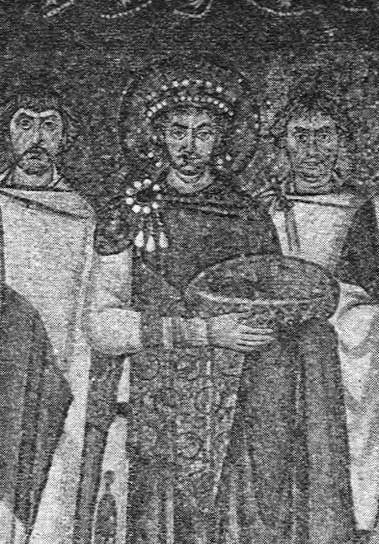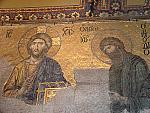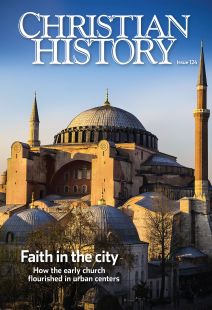Christian History timeline: the tumultuous life of early urban Christianity

— c. 800 BC Carthage is founded.
— 753 BC Rome is founded.
— c. 657 BC Greeks settle Byzantium.
— 332–331 BC Alexandria is founded.
— 300 BC Antioch is founded.
— 27 BC–AD 14 Augustus Caesar rules as Roman emperor.
— 14–37 Tiberius rules as emperor.
— c. 33 First deacons are appointed in the church.
— C.40 The word Christians is first used to describe believers in Antioch.
— 43 Rome invades Britain; London is founded.
— 47 Paul undertakes his first missionary journey.
— c. 48 Jerusalem Council meets.
— c. 50–95 Books of New Testament are written.
— 54–68 Nero rules as emperor.
— 64 Fire ravages Rome; Nero launches four-year persecution.
— 70 Romans capture Jerusalem and destroy the Temple.
— 79 Mt. Vesuvius destroys Pompeii.
— c. 100 The Didache, earliest church service book, comes into use.
— 106 Rome conquers Dacia (Romania); empire reaches greatest size (see map, p. 39).
— 118 Population of Rome exceeds 600,000.
— c. 112 Pliny consults Emperor Trajan on how to deal with those accused as Christians.
— 140 Justin founds school of Christian philosophy at Rome.
— 161–180 Marcus Aurelius rules as emperor.
— 165 Fifteen-year plague breaks out.
— c. 170 Celsus writes the first full book opposing Christianity.
— c. 180 Irenaeus of Lyons begins preaching to Celts in Gaul.
— 197 Tertullian begins writing apologetics in Carthage.
— c. 200 First mention of Christians is made in Britain.
— 203 Martyrdom of Perpetua and Felicitas occurs in Carthage.
— 212 Roman citizenship is extended to every freeborn person.
— c. 215 Hippolytus of Rome compiles the Apostolic Tradition, an influential set of guidelines for church practice.
— c. 232 The earliest house church we have archaeological evidence for begins meeting in Dura Europos.
— 248 Cyprian is appointed bishop of Carthage.
— 249–51 Decius rules as emperor and begins the first general persecution of Christians. Church leaders are arrested and martyred; many Christians deny the faith.
— 250 Christians represent about two percent of the Roman Empire’s population.
— 252 Plague of Cyprian breaks out.
— 255–256 African bishops insist on rebaptism of heretics and schismatics; Rome disagrees.
— 268 Goths sack Athens, Corinth, and Sparta.
— 270 Monasticism begins to spread in Egypt and Syria.
— 284–305 Diocletian rules as emperor.
— 285 The Roman Empire is divided into east and west.
— 293–303 Diocletian creates administrative tetrarchy; reforms army, currency, and taxation; establishes price controls.
— 298–302 Christians in the army are forced to resign.
— 303–304 Diocletian implements Great Persecution. Edicts call for church buildings to be destroyed, sacred writings to be burned, Christians to lose civil rights, clergy to be imprisoned, and all people to sacrifice to pagan gods on pain of death.
— c. 305 Council of Elvira in Spain sets rules for Christian behavior.
— 306–337 Constantine I, “The Great,” rules as emperor.
— c. 310 Constantine gives the Lateran Palace to the bishop of Rome.
— c. 311 Eusebius of Pamphilius writes Ecclesiastical History.
— 312 Constantine converts to Christianity.
— 313 Edict of Milan provides official toleration for Christians, who are about 12 percent of the imperial population.
— c. 315 Eusebius is appointed bishop of Caesarea.
— c. 318 Arianism gains popularity; Athanasius writes On the Incarnation.
— c. 319 Constantine begins building St. Peter’s Basilica.
— 320 The 40 martyrs of Sebaste are killed.
— 324 Constantine defeats Licinius to become sole Roman emperor; chooses Constantinople (formerly Byzantium) as his new capital.
— 325 Council of Nicaea, called by Constantine, affirms the divinity of Christ; also sets norms for liturgical celebrations and the date of Easter.
— 328–361 Temporary triumph of Arianism; Nicene bishops are deposed and banished.
— 330 Constantinople is dedicated and made capital of Roman Empire.
— 331 Christians raze the famous temple of Asclepius and replace it with a Christian church.
— 336 First evidence exists (at Rome) of December 25 celebration of Christ’s birth.
— 337 Constantine is baptized shortly before death.
— c. 340 Roman legislation begins to favor Christianity.
— C.350 Frumentius converts the royalty of Axum, Ethiopia; Christians represent 56 percent of the empire’s population.
— 355 Marius Victorinus, one of Rome’s most famous rhetors, converts to Christianity.
— 360 First Hagia Sophia built in Constantinople; it burns down in 404.
— 372 Basil of Caesarea builds his famous hospital.
— 379–395 Theodosius I rules as emperor.
— c. 380s Egeria writes an influential account of worship in Jerusalem.
— 380 Theodosius I makes orthodox Christianity the official religion of the empire.
— 381 Council of Constantinople affirms Nicene orthodoxy.
— 391 Pagan temple to Serapus in Alexandria is destroyed.
— 393 Theodosius I bans all pagan festivals including the Olympics.
— 410 Visigoths sack Rome.
— 415 Theodosius II has a new Hagia Sophia built.
— 426 Augustine completes City of God.
— 431 Council of Ephesus condemns Pelagianism.
— 438 Theodosius II issues laws allowing only Christians into the military.
— 451 Council of Chalcedon proclaims that Christ has two natures.
— 467 Western Roman Empire falls.
— 527–565 Justinian I, “The Great,” rules in the east.
— 529 Justinian begins issuing a famous code of laws.
— 532 Fire destroys Hagia Sophia.
— 537 Rebuilt Hagia Sophia is consecrated.
— 698 Muslim Umayyad Caliphate destroys Carthage.
This article is from Christian History magazine #124 Faith in the City. Read it in context here!
By the editors
[Christian History originally published this article in Christian History Issue #124 in 2017]
Partially adapted from timelines in issues 27, 37, 51, and 57 of CH, by W. H. C. Frend (1916–2005), University of Glasgow; David F. Wright (1937–2008), University of Edinburgh; and Bradley Nassif, North Park University, with additions by the editors.Next articles
The things that are Caesar’s
How Christians behaved as citizens, soldiers, and public servants
Rex D. Butler“The same kind of Christians we have always been”
We spoke to Karen Swallow Prior, author of Booked (2012) and Fierce Convictions (2014) and professor of English at Liberty University, about how Christians ought to live as citizens in the culture.
Karen Swallow Prior and the editors“God has given us the earth as a gift”
We spoke to Jill Sornson Kurtz, a professional architect with a particular interest in designing sustainable buildings for everyday life, on her work as a Christian in the building industry today.
Jill Sornson Kurtz and the editors







